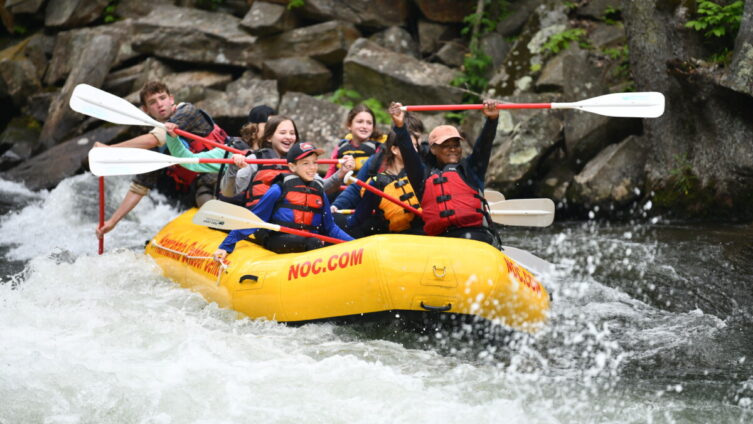
Sixth Grade Teacher Julia Stewart leads The Children’s School’s outdoor education program. In this article, she tells us how teachers connect classroom lessons to camping trips!
Have you ever noticed the mural underneath the portico outside the Gym Building? It stands as a lasting testament to the importance of the TCS Outdoor Education program to TCS graduates. When given the opportunity to preserve a memory of The Children’s School, most students chose to represent their time in the woods or on the water with their friends and teachers.
For nearly 45 years, The Children’s School Outdoor Education program has challenged students and teachers to take school into the woods. Away from the distractions of sports, tv, and technology, students are immersed in an engaging learning experience.
Though grade-level trips have changed over the years, the overall goal of the program – to gradually increase challenge, nurture character development, expose students to the physical and ecological diversity of Georgia, and build lifelong skills – has been maintained.
Before students experience their first overnight trip, many learning experiences in the earlier grades prepare them for a night in the woods. Sleeping in tents during naptime, hikes in Piedmont Park, observing leaves and insects, visits to nature centers, studying the Chattahoochee River, and climbing Stone Mountain are a few examples.
A TCS student’s first overnight trip is a two-night camping trip in the spring of their third-grade year. The trip is an opportunity to extend a native tree study through observation while hiking through the Piedmont region of Georgia at Dauset Trails Nature Center. Students practice pitching tents and rehearse other camping skills before heading into the woods.
Fourth graders begin the year with a two-night camping trip to Black Rock Mountain State Park in the Blue Ridge Mountains. Students focus on developing camping and organizational skills by planning activities, developing menus, cooking meals, and washing their dishes. In the spring, they spend three nights at an environmental center in coastal Georgia focused on a scientific exploration of the barrier island ecosystem.
In the first half of the fifth-grade year, students extend their study of Native Americans on an overnight trip to an environmental center where they explore the interaction of the Muscogee people and the Piedmont ecosystem. In the second half of the year, they visit George L. Smith State Park in the coastal plain of Georgia for a three-night kayaking and camping trip. Students spend the first day on the water receiving training, and on the second day, they test their new skills by paddling to a bird rookery and exploring a swamp ecosystem.
Throughout their time in Middle Grades, students in grades 6-8 raft on the Nantahala River, practice team-building, learn orienteering skills, and experience an extended backpacking trip in the North Carolina mountains.
Teachers find that these trips provide unique opportunities for teachable moments. The obvious lessons are about ecology and outdoor skills. The less obvious are the development of confidence, teamwork, and self-reliance.









